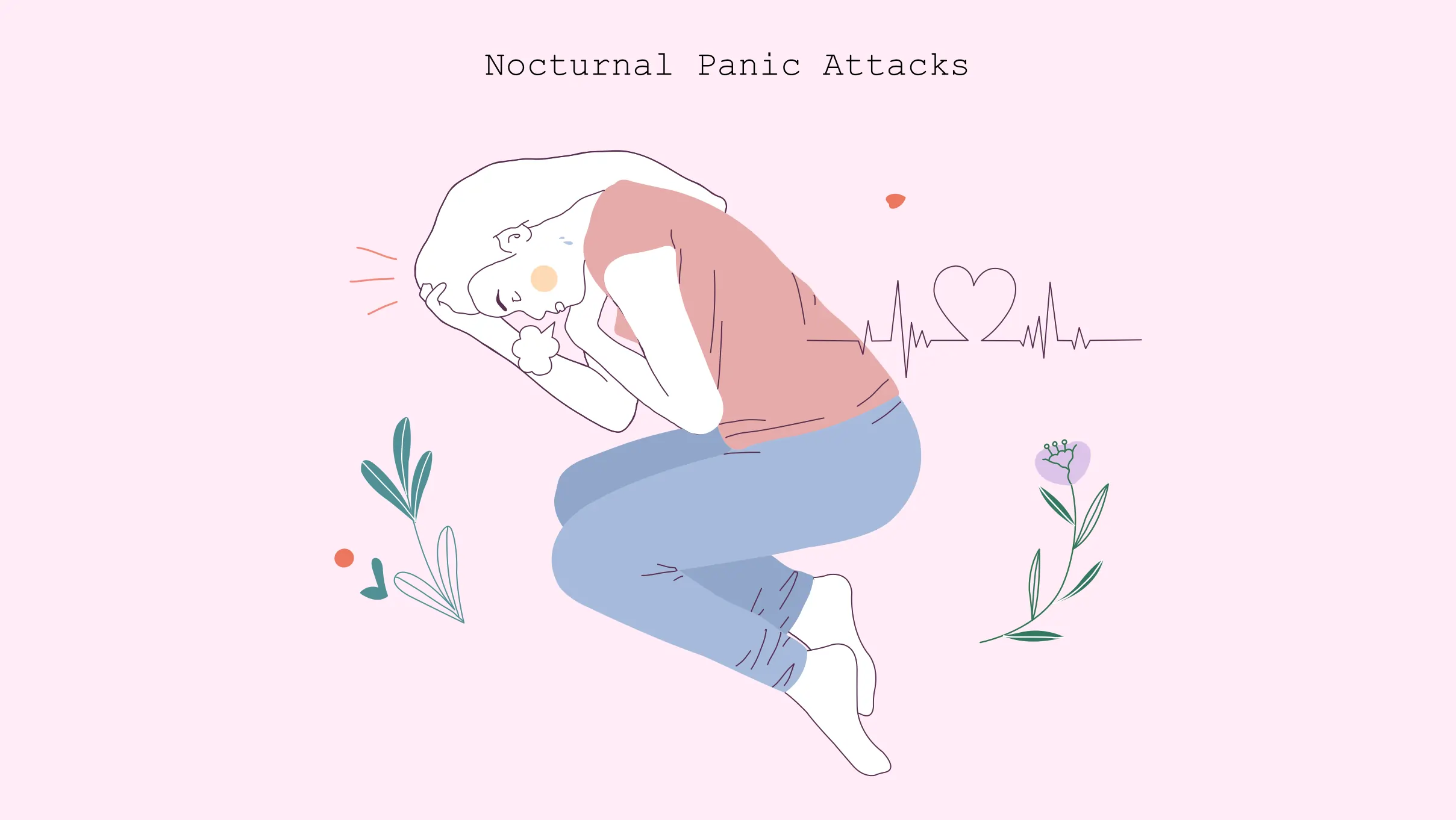What Really Causes Nocturnal Panic Attacks?
Written by

Medical reviewed by


Have you ever encountered jolting awake from sleep alongside a rapid heartbeat, sweating, trembling, shortness of breath, or heavy breathing? That is called a nocturnal panic attack. In a daytime panic attack, the person undergoes all these symptoms mentioned above. Though a panic attack might feel threatening and like a heart attack, it is not. Nocturnal panic attacks continue for a little while, though it takes a while to calm yourself down.
Nocturnal panic attacks can also be experienced in the form of hypnic jerks. A hypnic jerk is usually involuntary muscle contractions when falling asleep, but some part of your brain remains in the state of consciousness. A hypnic jerk is also called a “hypnagogic jerk” or “sleep starts.” Let us learn about nocturnal panic attacks in this article.
What Causes Nocturnal Panic Attacks
Panic attacks are one of the aftermaths of stress alongside other deteriorations. It doesn’t matter if it’s a daytime panic attack or a nocturnal panic attack. But, there might be many different causes that must be considered before jumping to conclusions.
Genetics
Many physical and psychological illnesses stem from your ancestors that you are now suffering from.
Studies have revealed that the maximum cases of panic attack disorder are hereditary. In addition, research shows that many mental illnesses are caused by biological, environmental, psychological, and genetic characteristics.
Chronic Physical Illness
Chronic physical illnesses like diabetes, cancer, asthma, or other life-threatening diseases which can be managed but can’t be cured cause significant stress on the mind and body.
Patients suffering from chronic diseases are constantly under intense stress and worry over everyday situations. The slight worrying and the minor episodes of panic attacks during daytime lead to you jolting awake from sleep in anxiety, a.k.a nocturnal panic attack.
Significant Loss
Environmental or eventual influences like traumatic events and losing an important figure or presence in life can also increase the prevalence of panic attacks. And then fear of panicking or traumatic nightmares may keep one from falling asleep.
Side Effects Of Medication
Some medications cause different side effects in different people. And feeling anxious and uncomfortable can be a side effect of one of the medicines that cure entirely other ailments.
Or it may be the reaction of the combination of food or beverages taken along with the pills.
For example, caffeine and sugar are the two major components that do not go with many medicines, and doctors usually advise that one mustn’t take them together.
Withdrawals
When a person is trying to withdraw from a toxic habit like alcohol or cigarettes, this can unintentionally lead to anxiety and panic attacks if immediate medical supervision is not provided. This happens because as soon as the alcohol level falls in the brain, the impaired neurons react uncontrollably eventually leading to panic attacks, hallucinations, and also seizures.
Life-Changing Events
Say, you got a call from that one company or firm you wanted to deal with or had just experienced a terrible break-up, or when the doctor calls you and says the test results for so and so are out.
In situations like these, you hear people say, “Gosh, just the idea of it kept me awake and anxious all night…” or, “the sleep was hard for me….”
This feeling is followed by the anxiety pumped by the uncertainty of events (what will happen…). It is the unknown that bothers them.
Use Of Certain Foods Like Caffeine
Caffeine is one of the items that promote anxiety because it is a stimulant. The jittery effect offered by caffeine resembles the after-effects of a frightening event. Caffeine infuses the cardiovascular fight or flight response in the body, and this is studied to increase the level of anxiety in a person.
Social Phobias
For people with social anxiety, everyday interactions and the presence of strangers (or friends and relatives too sometimes) in the same room as themselves cause unreasonable fear and anxiety. It is becoming more common to have social anxiety, which is anything but minor. But, most likely, everyone is aware of and is dealing with it their way. These people experience a fear of being judged negatively and scrutinized by others which leads to stress.
Mental Health Conditions
Usually, panic attacks are associated with many mental health conditions like panic disorder, depression, post-traumatic stress disorder (PTSD), social anxiety, or phobia like somniphobia, chronophobia, etc.
Symptoms Of Nocturnal Panic Attacks
Anxiety can also appear in physical forms, especially when you are sleeping. Nocturnal panic attacks occur in different forms. The following symptoms have been explained :
Jolting Awake
People undergoing anxiety often experience nightmares. And, when this anxiety rises, it worsens the nightmares resulting in the body jolting awake from sleep anxiety. This is one of the physical appearances of anxiety. Finding ways to reduce anxiety throughout the day might be alleviated by limiting anxiety during sleep.
Night Sweats
Though night sweats are the result of numerous reasons, for people who are already experiencing anxiety, the reason can be it. Sweating is a product of anxiety and doesn’t hold back only because you are sleeping. The best way to deal with this is to indulge in some nighttime therapy or medication and release the stress.
Chest Pain
One of the major difficulties posed by nocturnal panic attacks is chest pain which is again a common anxiety symptom. One might feel tightness and achiness around their chest, extending to their neck or jaw as well. The pain can be sharp or dull.
Chills
During nocturnal panic attacks, you might feel your body raising its core temperature. You shiver, have goosebumps, shake, and have chattering teeth.
Impending Terror
During nocturnal panic attacks, you might be waking up gasping for breath and that happens because of fear. People with anxiety often experience nightmares.
How to Deal with Panic Attacks at Night?
Nocturnal panic attacks can be hard, but they can be handled by embracing certain activities.
Move your Body
Whenever you experience nocturnal panic attacks, simply get your body moving. Anxiety and restlessness can sometimes be reduced by simply moving. You can simply move to your balcony, breathe in the fresh air, make something for yourself in the kitchen, or maybe work out a bit.
Change the Mindset
Panic attack in sleep will wake you up and might make you restless. Nocturnal panic attacks often make it hard for you to concentrate on regular work leaving you confused. If this happens, instead of sitting back and worrying, get up and engage yourself in something productive like reading a book, listening to calming music, and so on.
Perform Regular Chores
Indulge yourself in pursuing regular chores like laundry, cleaning, sweeping, washing dishes, and so on. You may find yourself at peace when you see work getting done, thereby healing nocturnal panic attacks as well.
Deep Breathing
How to stop panic attacks at night? Try breathing. Breathing is one of the convincing ways to dial down your nocturnal panic attacks. When you wake up feeling anxious and uncomfortable, take a long breath in and stop, count to five, and then let it out and stop again, count to three, and repeat. This may help you wonderfully.
Grounding
It might be hard to move a single muscle after jolting awake from sleep anxiety. So, try concentrating on one sense at a time. Follow the 3-3-3 rule.
First, take a scan around your room with your eyes and name three objects you recognize. Second, take a deep breath and concentrate on listening, and name the first three sounds you hear. Lastly, try to move your three limbs or parts of your body, like legs, fingers, toes, etc.
This method will help you divert your attention from negativity, regain your consciousness, and calm your racing heart.
Count Backward
It’s the classic way to calm down and fall back asleep. When you feel yourself losing to anxiety, take a quick scan of your room and start counting backwards. Looking around will help you gain back a little bit of awareness and help you concentrate on counting backwards.
Yoga
Yoga has been a helpful way of handling stress, and the same for nocturnal panic attacks. Exercising yoga poses such as Child pose, Happy Child pose, Easy pose, Standing Forward Bend pose, etc., are proven to help calm down while experiencing panic attacks.
Family Support
The support of family and friends helps in the journey of anxiety. Venting out before your loved ones will avoid you from feeling judged.
Laugh It Off
You might’ve heard, “Laughter is the best medicine.” Well, the thought isn’t completely wrong.
Laughter may help you in the short-term curing of anxiety. You can watch sitcoms, memes, or any comedy movie or show to stimulate laughter; the results will be the same.
Laughter stimulates positive hormone-like endorphin. It regulates the high intake of oxygen that stimulates the heart, lungs, and muscles. It soothes and regulates blood circulation and relaxes tense muscles in the body.
Medical Treatments For Panic Disorder
Minor, short-term, or rarely occurring panic attacks can be relieved with self-treatments. However, if you feel it occurring frequently, and if the situation feels out of hand, or when you start having suicidal thoughts, seek medical/professional care.
Prescription Medications
Instead of googling or inquiring about the types of medicines that can help with your nocturnal panic attacks, better knock at the doctor’s office. Since getting professional help and support will guarantee your fast recovery. Also, beware of the side effects of overdosing on medications.
Psychotherapy
Psychotherapy is a kind of talk therapy. In this treatment of handling mini panic attacks, talk to a licensed counsellor or psychologist who guides the person in understanding the panic attack triggers. This activity helps the person in changing their responses into positive ones. This continues till the panic attacks are calmed down.
Beta-Blocker Medications
Beta-blocker medications like Propranolol (Inderal) might be beneficial in handling the physical symptoms of a nocturnal panic attack. Though you can only consume it after your healthcare provider prescribes it.
Evaluation
Treatment of nocturnal panic attacks also involves the evaluation of both the mind and the body. Physical evaluation involves blood tests, thyroid checks, heart tests, and more. The mind evaluation involves enquiries about mood, behaviour, feelings, and more.
Medication
Certain medications, like antibiotics, cholesterol-lowering drugs, and antidepressants, can trigger nightmares. Discuss with your doctor to explore alternatives and manage the symptoms.
Things To Do to Get Better Sleep
To treat nocturnal panic attacks, there are certain steps you can undertake to gift yourself a better life.
Create a Realistic Sleep Schedule
Construct a decent and realistic sleep schedule with fixed sleeping and waking time. 7 to 8 hours of sleep is considered decent enough.
Mindful Eating and Drinking
Consuming lightweight but fulfilling foods at least 2 to 3 hours before bedtime is the key to reducing nocturnal panic attacks. Completely avoid drinking alcohol, nicotine, or caffeine.
Design a Cosy Environment
To reduce nocturnal panic attacks, design a soothing and calm environment for resting. Darken your room, light some scented candles, allow your room temperature to be at the right amount of cooling, and set a comfortable bed.
Limit your screen time before going to bed. Ensure the environment is quiet. Also, taking a hot bath before bed promotes better sleep by relaxing the tension in the muscles.
Limit Daytime Naps
To ensure a good night’s sleep, avoid resting or napping during the daytime as much as possible. This way, your body will feel more tired and fall asleep as soon as it hits the hay.
However, if you need to work during the night, take a long and late nap during the day to wake up before your work schedule.
Include Physical Activity in your Daily Routine
Physical activity is crucial in the daily routine. It can be any type of physical activity; you can exercise, work, do chores, or all of the above. However, avoid doing any physical activity before bedtime.
Because any physical activity can keep your mind and body active, so make sure to wrap it up early in the morning or before the evening.
Manage Worries
Resolving most of your worries before bedtime leads to relaxation. Keep a journal, make schedules, meditate, or organise your thoughts.
Following and managing minor steps and behaviours can help you fight off anxiety effectively. And if you feel you cannot manage it by yourself, get help from a professional or reach out to your family and friends.
Remember not to force your anxious friend or relative against their will. Be patient and let them come out at their pace. Next, consult a doctor before taking any medicine, and take it as prescribed.
Make sure to get enough sleep because a well-rested body and mind are gold and diamond mine.
FAQ:
Is Hypnic jerk anxiety?
Hypnic jerks are often a form of anxiety that makes the sleeper jolt awake while they are asleep.
Is a Hypnic jerk a seizure?
Though hypnic jerks resemble myoclonic jerks involving sudden twitching, it isn’t anything serious and is considered benign.
What is Somniphobia?
Somniphobia is the fear of sleep where the person worries the whole day about being unable to sleep.
Can you have anxiety in your sleep?
Yes, sleep anxiety is the fear or stress about falling asleep.
people like this article
Written by

Medical reviewed by






